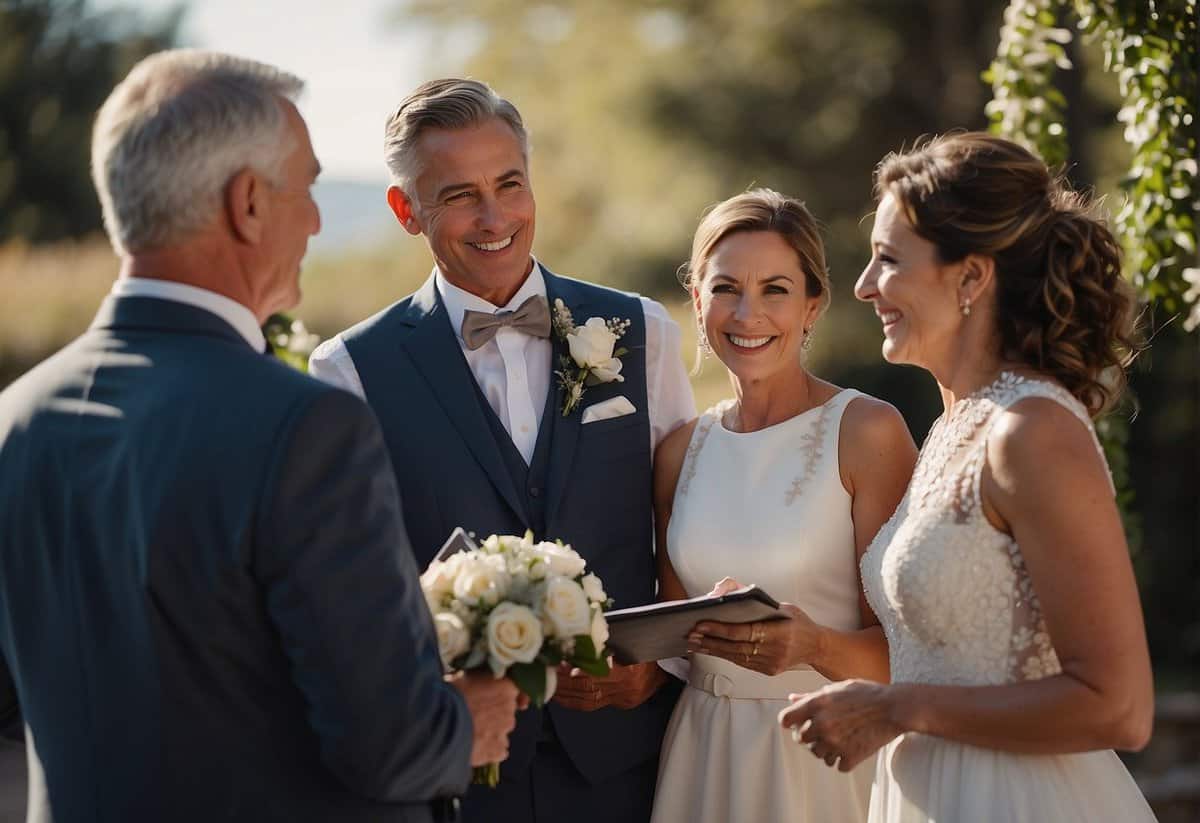Is It OK to Marry After 50? Embracing Love at Any Age
Deciding to marry after 50 is a significant choice that requires thoughtful consideration. At this stage of life, marriage isn’t just about romantic love; it also involves navigating the complexities of blending families, managing finances, and setting new life goals together. You might be bringing a wealth of experience and a different perspective on relationships compared to when you were younger. Whether it’s your first time down the aisle or you’re looking to embark on a second marriage, it’s essential to assess how this decision aligns with your personal and financial situation.

Marriage at this juncture can bring a host of emotional and social benefits, such as companionship, support, and happiness. However, there are also practical matters to consider, like the legal and financial implications of combining assets and possibly reconsidering retirement plans. It’s crucial that you’re open and honest with your partner about these topics. Furthermore, the wedding itself can be tailored to your tastes and experiences; maybe a grand affair isn’t as important as a smaller, more intimate celebration that reflects your journey. By considering these factors, you can approach this commitment with confidence and clarity.
Key Takeaways
- Marrying after 50 offers emotional companionship but requires careful consideration of practicalities.
- Open communication about financial and legal matters is imperative for a solid foundation.
- The wedding can reflect the maturity and uniqueness of your midlife love story.
Emotional and Social Considerations

When you consider marrying after 50, it’s essential to think about how new relationships affect your emotional health and social life. This stage of life can offer a deeper understanding of love and commitment, but it’s also tangled in existing relationships and personal history.
Creating New Bonds
Finding love after 50 can lead to fulfilling emotional connections and a renewed sense of purpose. Communication is key as you and your partner bring a wealth of experience to the table. It’s important to be open and honest to foster a strong connection that can become the foundation for your new life together.
Family Dynamics and Children
As a baby boomer, navigating family dynamics with adult children and potential grandchildren is crucial. They might have concerns or questions about your decision. It’s important to involve them in conversations early, ensuring they understand your needs for companionship and emotional well-being. Acknowledging their feelings and reassuring them of your love can help integrate your new partner into the family.
Navigating Past Relationships
Your dating history or a past divorce can impact your journey toward commitment. It’s normal to carry emotional baggage into new relationships, so addressing these feelings is vital for your peace of mind. Reflect on your past to understand what you want and don’t want in a relationship. This will help you make clear, healthy decisions about taking new vows.
Financial and Legal Implications

When you consider marriage after the age of 50, it’s vital to weigh how it will affect your finances and legal standing. From navigating retirement plans to understanding the nuances of insurance, each aspect requires careful consideration.
Understanding Retirement and Benefits
Retirement and benefits play a pivotal role in your life post-50. If you’re looking at Social Security benefits, marriage can affect the amount you or your spouse receive. As a married couple, you may be eligible for spousal benefits which could increase your retirement income. On the other hand, being married may mean a decrease in benefits if you and your spouse’s combined retirement incomes push you into a higher tax bracket.
- For Social Security, if one spouse has not worked or has lower lifetime earnings, they can receive up to 50% of the higher-earning spouse’s retirement benefit at full retirement age.
- Survivor benefits also come into play. If you’re widowed, your survivor benefits could be affected by remarriage, usually if you remarry before age 60 (or age 50 if you’re disabled).
Insurance and Health Care
After you turn 50, insurance and healthcare considerations become increasingly important. Combining insurance policies might lead to reduced premiums or better coverage. However, if your spouse has a less-than-stellar driving record or high-risk factors, it could also raise your rates.
- If you’re both employed and have access to employer-sponsored health plans, compare these carefully to see which offers better benefits for your combined needs.
- A life insurance policy can provide financial security for your spouse if you’re not there, and it’s important to review the beneficiaries upon marriage.
Managing Assets and Taxes
The financial union of marriage calls for a strategic approach in asset and tax management. You both bring your own financial histories and assets into the marriage, which can be managed jointly or separately.
- Certain tax benefits, such as the marriage bonus, can lower your taxes. Conversely, the marriage penalty might mean that you end up paying more in taxes than if you were single.
- Evaluate your finances and whether maintaining separate accounts or combining your money is the most beneficial for your circumstances.
- Be aware of the tax implications of any long-term capital gains, as marrying later in life may result in different rates depending on your combined income.
Remember, both finances and taxes are significantly influenced by where you live, as the cost of living and state tax laws will play a role. Your decisions about managing assets should coincide with a thorough understanding of these factors.
The Wedding Experience Later in Life

Marrying after 50 brings a mix of simplicity and sophistication to the wedding experience. Your celebration can reflect a lifetime of personal growth and preferences, truly making it your day.
Planning and Celebration
When planning your wedding, embracing your unique story is key. Vows at later-in-life weddings often carry the depth of your experiences, and it’s common to craft marriage vows that reflect the journey that led you here. When it comes to the ceremony and reception, you might find that smaller, more intimate gatherings align with your vision, allowing for meaningful interactions with every guest.
Travel and destination weddings offer appealing options as well. Since children are often grown and living independently, you have the flexibility to choose a locale that speaks to your shared passions, whether that’s a seaside resort or a historic castle.
Cultural Shifts and Trends
There’s a cultural shift in the air regarding later-in-life weddings, with an increasing number of couples opting to live together before marriage. Statistics suggest a rise in such unions, speaking to a trend of prioritizing compatibility and shared living experiences over traditional timelines.
Wedding planning also adapts to these trends, with registries evolving to include gifts that complement your already established homes. You’ll notice that cash registries or charitable donations are becoming more commonplace, honoring the full life you’ve led thus far.
When it comes to weddings after 50, it’s all about creating a day that resonates with your current life and shared values. The emphasis is on celebration and joy, rather than the pressure of meeting societal expectations.
Frequently Asked Questions

When considering marriage after 50, you might have questions about the benefits, likelihood of finding a partner, and what to consider before tying the knot. These FAQs will help clarify your concerns and assist in making an informed decision.
What are some advantages of getting married in your 50s?
Marrying in your 50s can bring increased happiness and companionship as many people value deeper connections at this stage of life. Financial stability is often stronger, allowing for a focus on enjoying shared experiences.
How likely is it for women to find a partner and marry after 50?
Although statistically, the odds of getting married after 50 are lower, many women still find meaningful relationships and choose to marry. The cultural tendency is shifting, and success stories are common, inspiring others to pursue love later in life.
What should men consider before deciding to marry after the age of 50?
Men should consider their financial position, health status, and readiness for commitment. After 50, priorities may differ from earlier in life, with a focus on companionship and shared values taking precedence.
Can you experience a fulfilling first marriage starting in your 50s?
Absolutely, many first marriages beginning in your 50s can be incredibly fulfilling. Individuals often enter these unions with more self-awareness and life experience, which can lay the groundwork for a strong and satisfying relationship.
Is there a significant difference between living together and marrying post-50?
Yes, there are legal, financial, and emotional differences between living together and marrying after 50. Marriage can offer security and societal recognition, while cohabitation may allow for more flexibility and independence.
What factors should be considered when contemplating a third marriage later in life?
When considering a third marriage, reflect on past relationship patterns, your current lifestyle needs, and compatibility with your partner. It’s essential to have open discussions about expectations and finances to ensure that both parties are entering the marriage with eyes wide open.


